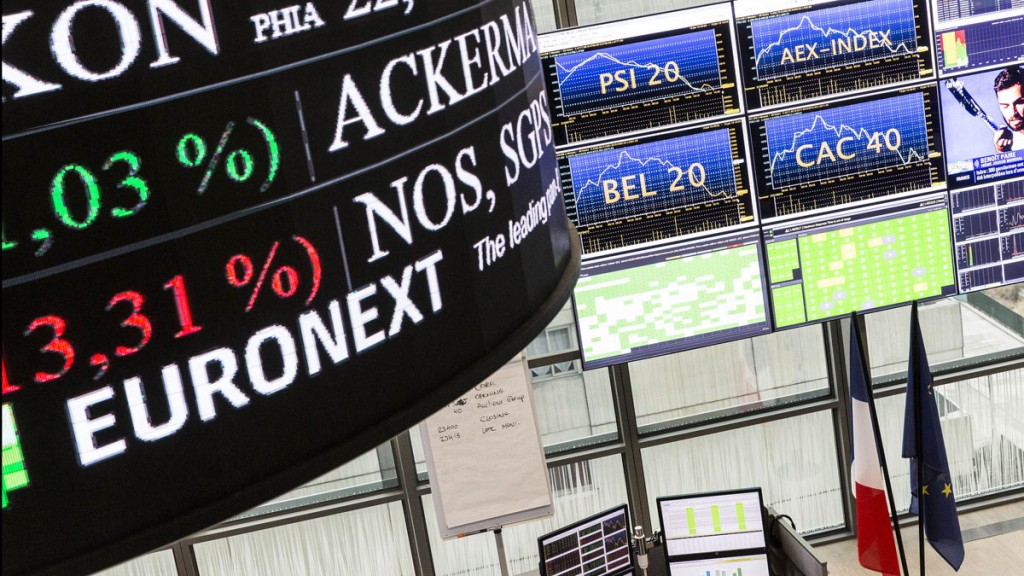
More kerfuffle over the debt crisis in Greece; fear over an “unelectable” candidate being elected in France; an anti-EU party leading the polls in The Netherlands, just before next month’s election. There’s a lot of tension in the eurozone, and it’s only likely to get worse over the next few months at least.
No wonder economists reckon the euro will hit parity with the dollar (ie one euro to one dollar) at some point this year.
So should you be bailing out of European stockmarkets? I don’t think so.
The eurozone crisis is spreading on all fronts
The spread between French and German bonds hit a four-year high again this week.
In other words, investors are demanding a lot more interest (in relative terms, at least) from the French government than from the German one.
If France wants to borrow money over ten years from investors, it needs to pay a whopping 0.82% more than Germany does. I know it doesn’t sound like much, but the gap between the two eurozone superpowers hasn’t been this big since August 2012.
What’s the story? Well, a new opinion poll showed that National Front leader Marine Le Pen (who wants to take France out of the euro) is the clear favourite to win in the first round of the presidential elections in April.
Now, this isn’t that much of a surprise, and she’s still expected to lose the second round. But after last year’s various “it’ll never happen” moments, investors are understandably a little warier of taking these things for granted.
Then of course you’ve got the Dutch election next month. Again, as in France, the headlines don’t entirely convey the fact that even if Geert Wilders’ anti-EU PVV wins, it may be unable to form a government. But again, it’s hard to take anything for granted.
And then of course, you’ve got little old Greece kicking off again.
Even by eurozone standards, 2017 is shaping up to be messy.
Here’s why you should hang on to your European stocks
The irony is that the economic data out of Europe is steadily getting better. For example, both the French and German private sectors have seen activity surge this month.
The trouble is, improving data might make the eurozone’s overall problems even harder to tackle.
You see, the European Central Bank (ECB) has an increasingly tricky juggling act to perform. In an ideal world, ECB boss Mario Draghi would like to do exactly what every other developed country has done – he’d like to repress interest rates all across the eurozone, until inflation takes off properly and defuses the huge debt bomb we’re all sitting on.
The problem for Draghi, of course, is that the most important eurozone member – Germany – isn’t at all on board with any of his policies. Germany doesn’t need weak monetary policy; Germans don’t like having a weak currency (despite the competitive benefit they reap from it); and Germany is particularly sensitive about rising inflation.
So signs of improving economic health are bad news in a way for the ECB, because it makes it harder for Draghi to justify his loose monetary policies and any extension of his quantitative easing.
That in turn, might mean that it’s impossible to keep the euro weak, which is one of the only things helping to keep the weaker eurozone economies afloat.
Why might the euro strengthen from here? Markets are contrary things (which is why it helps to think in a contrary manner when you’re dealing with them).
So let’s start with the fact that almost everyone expects the euro to hit parity with the dollar this year. The fact that everyone thinks this, means it probably won’t.
I know that’s not very helpful, but sometimes it really helps you to think clearly if you just start from the premise that, despite logic being on your side, your view on the market is wrong, and then work back from there to figure out why it could be wrong.
So why could it be wrong? Because while the headline focus is on the scary politics, all of that stuff is hard to price in.
The euro will certainly tank if Marine Le Pen ends up winning the French election; I have no quarrel with that idea. But unless and until that happens, the monetary policy fundamentals – driven by the economic fundamentals – will win out. And for now, the monetary policy fundamentals point to euro strength rather than weakness.
In the US, the Federal Reserve could easily disappoint the market, simply by not raising interest rates rapidly enough. In the eurozone, all Draghi really has to do is to meet expectations by not extending QE beyond December. And chances are, with the level of political hostility he’d face, he won’t be able to do much more than “jawbone” – talk the currency down.
If you then throw in a scenario where le Pen fails to win the French election in May, then suddenly it’s all about euro upside. Even an exit from the eurozone by Greece or Angela Merkel losing the German election would be well-received by comparison.
I’m not saying you should go out and bet on currencies, because that’s a surefire way for most people to lose lots of money, even if they’re right. But I do think it makes sense to hold on to your European stocks, because if the political scenarios don’t turn out the way that some fear, then they could do very well this year.